
Megachile rotundata, the alfalfa leafcutting bee, is a European bee that has been introduced to various regions around the world. As a solitary bee species, it does not build colonies or store honey, but is a very efficient pollinator of alfalfa, carrots, other vegetables, and some fruits. Because of this, farmers often use M. rotundata as a pollination aid by distributing M. rotundata prepupae around their crops. Each female constructs and provisions her own nest, which is built in old trees or log tunnels. Being a leafcutter bee, these nests are lined with cut leaves. These bees feed on pollen and nectar and display sexual dimorphism. This species has been known to bite and sting, but it poses no overall danger unless it is threatened or harmed, and its sting has been described as half as painful as a honey bee's.
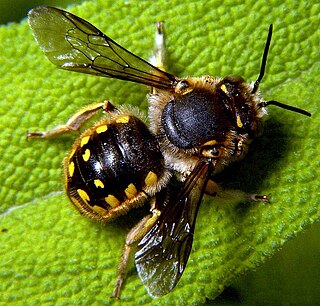
Megachilidae is a cosmopolitan family of mostly solitary bees. Characteristic traits of this family are the restriction of their pollen-carrying structure to the ventral surface of the abdomen, and their typically elongated labrum. Megachilid genera are most commonly known as mason bees and leafcutter bees, reflecting the materials from which they build their nest cells ; a few collect plant or animal hairs and fibers, and are called carder bees, while others use plant resins in nest construction and are correspondingly called resin bees. All species feed on nectar and pollen, but a few are kleptoparasites, feeding on pollen collected by other megachilid bees. Parasitic species do not possess scopae. The motion of Megachilidae in the reproductive structures of flowers is energetic and swimming-like; this agitation releases large amounts of pollen.

Lotus corniculatus is a flowering plant in the pea family Fabaceae. Common names include common bird's-foot trefoil, eggs and bacon, birdsfoot deervetch, and just bird's-foot trefoil. It has a wide distribution and is a favored forage for livestock.
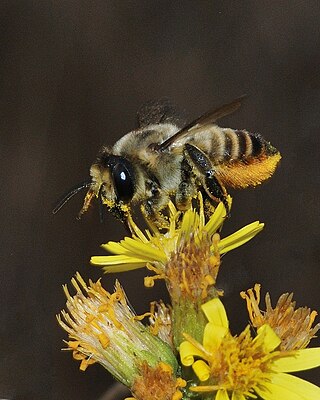
The genus Megachile is a cosmopolitan group of solitary bees, often called leafcutter bees or leafcutting bees; it also includes the called resin bees and mortar bees. While other genera within the family Megachilidae may chew leaves or petals into fragments to build their nests, certain species within Megachile neatly cut pieces of leaves or petals, hence their common name. This is one of the largest genera of bees, with more than 1500 species in over 50 subgenera. The alfalfa leafcutter bee is managed on a commercial scale for crop pollination, and has been introduced by humans to various regions around the world.
Megachile zombae is a species of bee in the Megachilidae family. Natively endemic to Malawi and identified in 1977, these are solitary bees. The name derives from Greek mega 'large' + cheil- (χειλ) 'lip' and a district Zomba, in Malawi.

Megachile aethiops is a species of bee in the family Megachilidae. It was described by Frederick Smith in 1853. The species is known only from Australia.
Megachile albohirsuta is a species of bee in the family Megachilidae. It was described by Pasteels in 1965.

Megachile melanophaea is a species of leaf-cutter bee in the family Megachilidae. It was first described by the British zoologist Frederick Smith in 1853. It is native to North America.
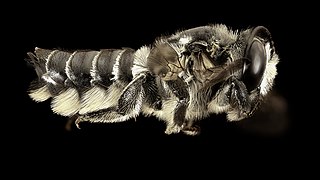
Megachile pruina, also known as the Hoary Leafcutter Bee, is a species of bee in the family Megachilidae. It was described by Smith in 1853.
Megachile pulvinata is a species of bee in the family Megachilidae. It was described by Chlerogas Vachal in 1910.

Coelioxys banksi is a species of leafcutter bees in the family Megachilidae. It is a parasite of Megachile relativa nests.

Megachile pseudobrevis, the southeastern little leaf-cutter bee, is a species of hymenopteran in the family Megachilidae.
Megaphorus pallidus is a species of robber flies in the family Asilidae.
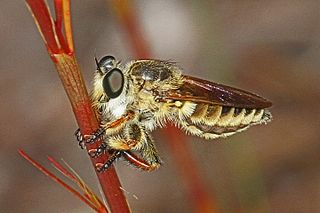
Megaphorus is a genus of robber flies in the family Asilidae. There are about 18 described species in Megaphorus.
Megaphorus willistoni is a species of robber flies in the family Asilidae.
Megaphorus laphroides is a species of robber flies in the family Asilidae.
Megaphorus prudens is a species of robber flies in the family Asilidae.
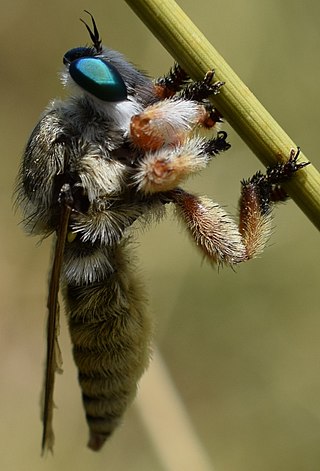
Megaphorus acrus is a species of robber flies in the family Asilidae.
Megaphorus minutus is a species of robber flies in the family Asilidae.











